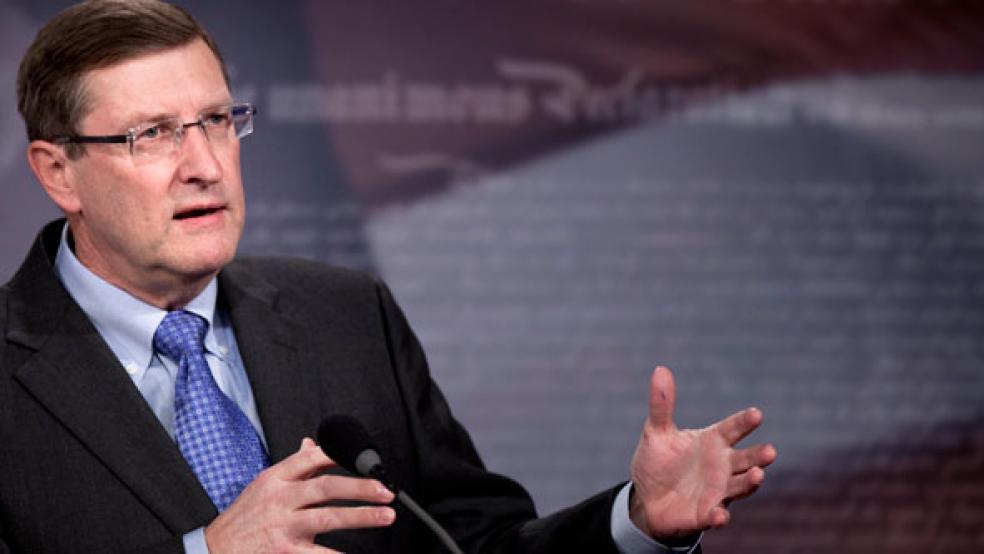America’s income and corporate tax systems are too broken to be rescued, so instituting a value-added tax is the only sensible way to increase revenue without damaging economic growth, a bipartisan panel of experts concluded today before the Senate Budget Committee.
The VAT, a sales tax created in Germany about 100 years ago, protects against double taxation by using an invoice system. It tracks products that are resold or used as inputs in order to credit resellers the taxes that were already paid. Unlike the corporate income tax, the VAT can be rebated for exports, so the goods are only taxed by the country that sells them. It’s used in most European nations and in Canada.
“A VAT is where we’re going to have to end up,” said Rosanne Altshuler, an economics professor at Rutgers University. “The VAT, in combination with broadening the tax base, would allow us to buy down our corporate income tax rate” by allowing for lower rates.
Presently the U.S. corporate tax rate is 35 percent, the highest of any nation besides Japan. However, Japan’s prime minister announced the rate will be lowered this spring. Prospects for a similar reduction at home now seem unlikely in lieu of the potential revenue source declines from the extension of Bush-era tax cuts. The U.S. faces a projected $1.5 trillion deficit at year’s end.
Skepticism from Lawmakers
The panelists, including a former Bush administration economic adviser, were unanimously in favor of a VAT, but most lawmakers expressed skepticism – a trend not surprising given the Senate’s vote last spring against creating a VAT, by a margin of 85-13. Politicians are especially concerned that constituents might view a VAT as a back-door means of hiking sales taxes.
“As interested as I am in moving toward a VAT tax, I’m not sure I see that as politically viable in the short term,” said Sen. Rob Portman, R-Ohio, a new member of the panel. “But perhaps we can move to an income tax that is simpler, has fewer economic distortions, makes us more competitive, and eventually moves us toward some of the more dramatic changes that lead to a consumption-based tax.”
Sen. Ron Wyden, D-Ore., also a member of the Senate Budget Committee, unveiled a proposal last February with former New Hampshire Republican Sen. Judd Gregg. It would propose revamping the existing tax code by reducing the number of tax brackets, shortening the individual tax return, lowering the corporate income tax rate, and ending special tax treatment for special interests.
“As far as I can tell, reforming the federal income tax is the only major response with an actual track record of creating millions of private sector jobs without adding to the deficit,” Wyden said during the hearing Wednesday.
Larry Lindsay, director of President George W. Bush’s National Economic Council from 2001 to 2002, said there are ways to make consumption-based taxes progressive, even without an income tax, which levels the tax playing field for lower-income individuals with refund and transfer programs like the Earned Income Tax Credit. Unlike Altshuler, who proposed a VAT system that also maintains an individual income tax, Lindsay favors a business receipts tax system — a variation of the VAT — without an income tax.
Under the business receipts system Lindsay proposes, the tax base would be total receipts by a company minus what was paid and taxed to a different company in the process of making the product. “I would reject retaining the income tax along with it because I see it as adding yet another definition of income, another calculation everyone has to do as a net gain,” he said. “If we’re going to move to that system anyway, why wouldn’t we want to move as much of the base into the system as possible, [rather than] half of the tax system.”
There’s some consensus among lawmakers that paring down the nearly 200 tax credits, deductions, deferrals and exemptions in the tax code is a priority. President Obama even called on lawmakers to do so in his State of the Union address last month. The aforementioned tax expenditures, which were targeted by the president’s fiscal commission, add up to more than $1 trillion a year — nearly as much as the U.S. collects in individual and corporate income taxes combined, according to the Office of Management and Budget.
Related Links:
Corporate Tax Rates Beg for Cut but Reform Tough to Achieve (USA Today)
Larry Lindsay Calls for a VAT (Slate)
Senate Budget Panel Chief Says Tax Reform Part of Budget Fix (iMarketNews)





